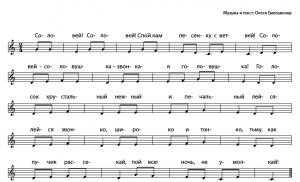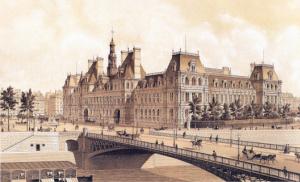Winter will warm. Cold summer 2017: what is happening with the weather in the Moscow region Abnormal June
Falling in the Moscow region from the sky on the second day of the calendar summer, someone defined the white substance as hail, someone as snow. Rather, in different areas it was both. "Reedus" tried to find out what this phenomenon is and why this disgrace happens in the first month of summer.
There is no particular disgrace with the weather this year, you just need to keep in mind weather past years, the leading meteorologist of Gismeteo, Leonid Starkov, stands up for nature.
“In 2016, similar weather - with snow pellets - was observed on June 6-7. And the daytime temperature then did not rise above +9. Typically, such an intermediate state of precipitation between snow and hail is characteristic of periods of sharp cooling during the warm period. But this year there was no stable warm period as such - average temperature May was only +10.9 degrees, this is the coldest May in the last 16 years,” he told Reedus.
Before that, the same cold Mays were observed in 2001 and 2008, but then average monthly temperature slightly over 11 degrees.
Judging by the frames of the film “The Cold Summer of 53rd,” the weather in Moscow then was also not beachy
If you raise the observation diaries for even more early periods, then in 1999 the average temperature in May was generally 8.7 degrees. Therefore, the current “green winter” of meteorologists is neither surprising nor frightening.
“In fact, if we are to be worried, then this should be done not because the summer will differ little from winter, but because of the possibility of repeating the summer of 2010, when Russia burned for all summer months. All the seven years that have passed since that drought in the media only scare that now every summer will be like this. But it turned out to be a cold summer - the media is again whipping up panic, ”Starkov frowns.
On June 9, in the capital, the temperature should rise to 25-30 degrees during the day, and it can be confidently predicted that the media will talk about “global warming”.
Employees of the Laboratory of Hydrometeorology of the Arctic of the Hydrometeorological Center of the Russian Federation, together with foreign colleagues, studied the processes of area reduction sea ice Arctic Ocean and predicted their climatic consequences. Weather anomalies, in particular cold and rainy summer 2017 on the European territory of Russia, most likely, are the result of a decrease in the area of the ice cover of the Arctic Ocean. The research was supported by a grant from the Russian Science Foundation (RSF). The results of the work were published in the journal Environmental Research Letters.
The processes of melting ice in the Arctic today have accelerated significantly. Over the past decade, sea ice extent (estimated at the end summer period) decreased by about 40%. disappearance arctic ice fraught with serious environmental consequences, in particular the extinction rare species animals. On the other hand, the release of the waters of the Arctic Ocean from under the ice opens up new opportunities in the development of minerals on the Arctic shelves, expands the zone of industrial fishing, and improves conditions for navigation.
Employees of the Hydrometeorological Center of the Russian Federation, together with colleagues, studied the processes of ice melting in the Atlantic part of the Arctic Ocean and described the consequences of these processes for the entire Arctic region. As a result of the work, a complete picture of hydrometeorological changes in the Arctic was obtained. Warm ocean currents bring heated waters from the Atlantic Ocean to the Arctic Basin and the Barents Sea, providing accelerated ice melting. Ice-free water areas effectively absorb solar energy and quickly warm up, releasing excess heat and moisture into the atmosphere. Then, air currents and major storms redistribute heat and moisture over almost the entire Arctic, which leads to changes in the energy balance between the ocean and the atmosphere. In particular, scientists have found that downstream long-wavelength radiation (NDI) increases significantly. This is infrared (thermal) radiation emitted primarily by water vapor and clouds and directed towards earth's surface. Rising NDI contributes to the warming and melting of Arctic sea ice.
The blue-violet contours show the contours of the sea ice concentration during the winter season from 1979 to 2017 (dark blue indicates the lowest concentration). The red arrows represent the direction of the spread of the Atlantic water. The thin black and red lines show the position of the 20 percent ice stock in March 1979-2004 and 2012, respectively.
Russian scientists drew attention to the significant impact of large storms and the atmospheric circulation regime on the state of the ice cover. For example, Storm Frank, which occurred in December 2015, brought anomalously high temperature(deviation from the mean climate temperature was 16°C), and the flow of NDI is significant (compared to the climatic norm). As a result, the decrease in ice thickness in some regions of the Arctic Ocean has reached 10 centimeters.
Scientists obtained data on the area of sea ice from satellites, and the fields of distributions of temperature, pressure, humidity and radiation from the so-called reanalysis product (ERA-Interim). Reanalysis is a computer model that assimilates long-term observational data (radiosonde, aviation, etc.) for different characteristics atmosphere.
"The new knowledge obtained as a result of our work allows us to more accurately analyze the causes and consequences of the processes taking place in the Northern Arctic Ocean. If a sufficiently large area of the Arctic turns out to be uncovered by ice, cold and humid air to the European territory of Russia. IN Lately this situation is observed more and more often and becomes the cause of weather anomalies, such as the atypically cold summer of 2017, "said Vladimir Vladimirovich Ivanov, head of the laboratory of hydrometeorology of the Arctic, Doctor of Physical and Mathematical Sciences.
Meteorologists need to develop new algorithms that include information about natural processes taking place in the Arctic. This will make weather forecasts more reliable and take into account current climate changes.
On Tuesday, January 31, the Governor of the Moscow Region Andrey Vorobyov delivered his annual address to the residents of the region. RIAMO has collected 15 of Vorobyov's most important statements. Further direct speech.
We need our breakthrough. In what? The Moscow region should enter the top five (regions of the Russian Federation - ed.) in all key areas of human life. Safety and health, education and ecology, roads and quality of housing and communal services, efficient public administration and favorable investment climate.
In three years of work, we were able to close 20 solid waste landfills. A federal program has been adopted under which we will continue to close these dangerous landfills. We will open new, safe and build waste processing plants.
Every region and every person wants to live richly. That is why our priority is the economy and investment.
Today the Moscow region is in the top three by gross regional product. 3 trillion rubles. And our neighbor has 13. Despite the fact that only the Moscow Ring Road separates us. In terms of per capita income, we were 17th in the country, and now we are in 15th place.
We will continue to settle the barracks. As part of the execution of the presidential decree, 16,000 people have already received new apartments. Here are some very fresh shots from Shchelkovo and Kotelniki. People moved from stables, barracks.
Most Valuable Result industrial, agricultural, investment policy - this is work close to home. In Kashira and Noginsk, in Lyubertsy and Shatura. In total, there are 250 thousand new jobs in the region.
In four years we have released on the routes of 2.5 thousand new buses - this is exactly half of the Mostransavto fleet - and 96 electric trains. Such renewal of the park in the modern history of the Moscow region has not yet been carried out.
To our healthcare workers We raised salaries twice last year. This year, doctors and medical staff.
By the quality of education we maintain leading positions in the country. The number of "stobalniks" of the Unified State Examination in Russian, history, foreign languages. This is an objective indicator. Our graduates are among the best.
We negotiated with residents about the improvement of parks. At the start, we had 25 of them - and all in an extremely neglected state. Today there are already 82 of them - with lighting, paths, benches, a development plan, and most importantly - with strollers and children's laughter.
During these four years we have become the best in the country in terms of the smallest number of officials per 10,000 population. This figure is 17 people. That is, we have the most optimized management structure at the regional and municipal levels.
Last year we opened six overpasses (Stupinsky district - two, Khimki, Solnechnogorsk, Dolgoprudny, Chekhov district), 28 roads, including the long-awaited Podolsk South Bypass, Aviatsionny village bypass, entrances to Zhukovsky, Ramenki, Yegoryevsk and other settlements.
For three years - a decrease(mortality on the roads - ed.) by 30%. In January, we reduce mortality by 15%. Nevertheless, in absolute terms, we are still anti-leaders. I am sure that if we keep up the pace, we can turn the tide.
Today we have 104 multifunctional centers - in every settlement within walking distance, as required by the May presidential decrees. The number of applications has grown in four years from 400,000 to 12 million a year.
Crime rate in the area in 2016 fell by 20%, below the national crime rate. We are implementing a very important "Safe Region" system.
Did you see a mistake in the text? Select it and press "Ctrl+Enter"
The summer of 2017 did not bring any joy to the citizens of Russia. Throughout June, there are heavy rains, showers and even hurricanes. The abnormally cold summer of 2017 spoils all plans. Indeed, in such weather it is difficult even to get home, not to go to the beach. Why is June so cold? Will the heavy rains stop? What to expect from July and August? What will the weather be like in the next months of summer?
Causes of abnormal summer 2017
Meteorologists believe that the cold summer came due to several reasons. First reason- abnormal heating of the Earth. The fact is that the mesosphere and other layers of the air shell are very hot. Because of this, the temperature on Earth is slowly decreasing. Scientists predict the consequences of such weather - not global warming, but global cooling, which could lead to an ice age.

The second reason- Launch of a Chinese satellite called Mo Tzu. It is the first satellite designed for quantum transmission of information on Earth. During the mission, the mechanism of quantum entanglement is being investigated, and test quantum teleportation is also being carried out. The first experiments were successful, but then something went wrong.
When the satellite begins to transmit information, negative air ions increase in the atmosphere, which contribute to the deterioration of the weather. Hurricanes and downpours form on Earth. In addition, monopoles appeared in the stratosphere. IN last time they were seen in 1816, which was nicknamed the year without a summer. Then the main reason for the cold summer was the eruption of the Tambora volcano.

No matter how absurd this reason may be, world experts believe that the equipment on the satellite and the ongoing quantum operations can really affect the weather conditions of the planet. But they also report that soon everything should return to normal, and the long-awaited summer will come.
Third reason- "North Atlantic bloc". According to meteorologists, the "North Atlantic block" is an anticyclone. A powerful ridge formed at the middle level of the troposphere high pressure, which does not pass air masses from west to east. Now this block is located in the UK, so only Arctic air enters Russia.
Each of these reasons can affect the planet as a whole in its own way, but so far the result is the same - an abnormally cold summer is observed. One can only hope that July and August 2017 will bring the citizens of Russia a little more warmth than June.
Forecasts for July and August 2017
According to meteorologists, abnormal heat will not be in summer 2017. But already in July, the thermometer scale will begin to rise. A long coolness will be replaced by a real summer. The air temperature is expected to reach +26 - 29 degrees. After the holiday of Ivan Kupala, the temperature will rise by a few more degrees.
According to the popular forecast, in July, the Russians will again expect rain. Indeed, in the middle of the month the rains will return for several days. But the end of the month will please with the absence abnormal weather. It will be warm, the temperature will rise to 32 degrees.

According to the people's forecast, the weather in August will constantly fluctuate. The first week of the month will start with quite hot weather. This week will be the peak of the heat wave of the anomalous summer of 2017 in Moscow. Residents of Russia are advised to visit the beaches and sunbathe a little. Meteorologists pay attention to the fact that forest fires are possible at this time.
After a week of heat, we will again have to go through several rainy days. From 25 degrees Celsius the temperature will drop to 17 degrees. A little more heat should be expected in the second half of the month. August will end heavy rain and cold wind.
Summer 2017 will give not only heavy rains but also wonderful summer warmth. Every resident of Russia will be able to enjoy the hot weather. Do not get upset ahead of time, even an abnormally cold summer will end one day.
Published on 06/19/17 09:20Scientists "blamed" China for the cold summer. And the Hydrometeorological Center of Russia has its own explanation.
June 15 was the coldest summer day in 67 years of meteorological observations. The air in Moscow warmed up to only 10 degrees, and in the morning it was 7-9 degrees.
Now scientists have found the culprit in the abnormally cold summer of 2017. They could be the Chinese satellite "Mo-Tzu", which participated in experiments on quantum movement. Measurements showed that in those days when the device worked in full mode, the weather deteriorated sharply, it rained, the winds intensified, NSN reports.
However, according to them intkbbee According to him, the concentration of particles in the atmosphere will soon normalize. Now experts intend to study the impact of processes associated with quantum communication on the weather, since before the launch of an innovative satellite conducted by Chinese scientists, such factors were not studied.
In the next 10 years, the climate is likely to be undulating, with frequent changes in higher and higher low temperatures. The head of the Hydrometeorological Center Roman Vilfand told Rossiyskaya Gazeta about this.
According to him, normal average temperatures will be less, but the alternation of rainy and dry periods will increase. It is also possible that anomalous warm winters and frosts in summer. As for the nearest summer prospects for residents of Central Russia, then, according to the head of the Hydrometeorological Center, July still promises to please Muscovites and residents of the central regions warm weather, which will be several degrees higher than the norm. And even complete bathing season will be able to open. True, while the water temperature in Moscow and Moscow region reservoirs does not exceed 14 degrees.
The next week, as the head of the laboratory of the Hydrometeorological Center Lyudmila Parshina, said, the capital region is expected to be moderately warm. Daytime temperatures will fluctuate within 22-24 degrees, night -10-12 degrees. Rains are possible.
As for others Russian regions, then the temperature background is different everywhere - up to 40-degree heat, as in Novosibirsk, Tomsk, Kemerovo regions and in the Altai Territory, to night frosts, as in the Murmansk region.













